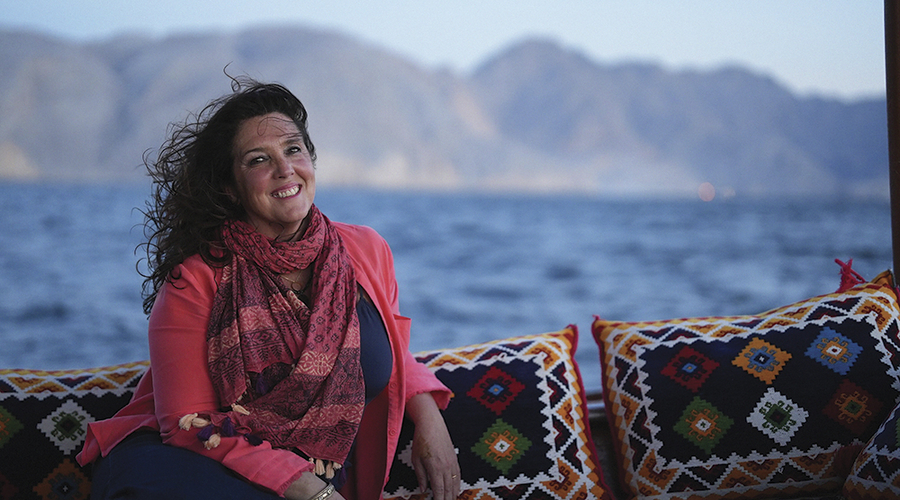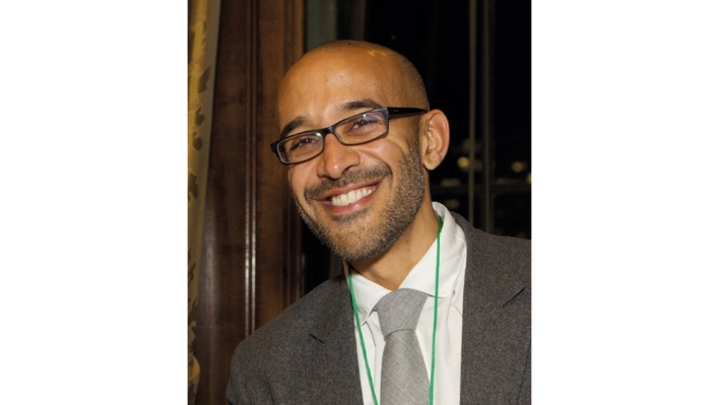Matthew Bell talks to Bettany Hughes, the prolific TV historian who has performing in her blood
In her 2011 RTS Huw Wheldon Memorial Lecture, Bettany Hughes recalled an awful meeting at the BBC that could have ended her TV career before it had begun.
It was the 1990s and Hughes felt “history wasn’t getting a fair crack of the whip”. Her pitch to a senior producer “was going down like a cup of cold sick” before he administered the coup de grâce: “One, no one is interested in history any more; two, no one watches history programmes on television; and three, no one wants to be lectured by a woman.”
Rarely has anyone in television been so wrong. History has proved hugely popular over the past couple of decades, with many academics, such as David Olusoga and, yes, even women, Mary Beard and Lucy Worsley, becoming household TV names. Arguably, though, no historian has been as prolific as Hughes. Since her breakthrough with Breaking the Seal: Domesday for the Open University on the BBC in 2000, the classicist has made more than 50 programmes.
The dismissive words of the BBC producer, she tells Television, “gave me the fire in my belly…. I knew he was wrong, but I had to prove it. Looking back, I can kind of, not understand, but see why he said what he said because [in the 1990s] there was this sense… that all the answers lay in the future and the past was irrelevant.… But how wrong could he be?” she says, laughing.
We are chatting in a café at Somerset House, while outside snow falls on the ice rink. It’s a freezing January day in London, but it is nothing compared with the temperatures the historian can expect in wintry Georgia, to where she is flying the following day to film her Channel 4 series Bettany Hughes’ Treasures of the World.
Episodes on Estonia, Bulgaria and the Caucasus are already in the can for the third series, which airs in April.
“I’m living in the past in my head and it’s a fantastic place to be”
“Treasures was our lockdown project,” says Hughes. “We [wanted to] remind people that there is a beautiful world out there. I had family members, close friends and colleagues who died during the pandemic, and there was a moment when we all thought the world was going to end, but what we did, as well as storing loo roll, was share poems, TikTok videos and music. Wasn’t that fascinating? It is clearly in our genetic memory that survival is not just about having enough food and water, it is about being nourished in other ways.”
Treasures of the World exhibits Hughes’ boundless enthusiasm for the classical and medieval worlds. Her passions may seem niche, but Channel 4 trusted the series’ wider appeal to give it a Saturday-evening slot.
She says the series is watched by up to 400 million people a year worldwide, adding: “That’s a lot of people who want to learn something. There’s no agenda, no spin; it’s not tricksy, it’s not trying to agitate or provoke, it’s just fascinating, and that’s not going to change.”
Archaeologists suggest treasures and allow access to their sites, because, she says, they “know that we let the stories speak for themselves. We don’t need to sensationalise them, because they’re amazing.”
Hughes has a degree in ancient and modern history from Oxford, and has lectured around the world. She is also a highly respected author whose latest book, The Seven Wonders of the Ancient World, was well reviewed on publication last month.
“I can’t stop writing – it’s what allows me to be on TV as a historian.… I wouldn’t have the credibility without it. I love sitting, late at night at my desk… diving into research, or doing that in the field. I’ll never stop.”
Hughes is a TV natural, as is her brother, Simon, who, after retiring from professional cricket, became a commentator and analyst. Her parents were actors and it is easy to imagine family life was more than a little lively. “There was no shyness,” admits Hughes. “We were not embarrassed by the idea that you can communicate things to other people – it didn’t feel like it was showing off; it felt like that was an important thing to do, not an indulgence.”
“My memory of Dad is of him being out of work for much of my childhood, which means you don’t take anything for granted – that’s a very good pillar to have when you’re working in television. It’s always a pleasure when something comes off.”
Her dad left school at 14, her mum at 16, which Hughes says made her keenly aware that university was not the only source of education: “I knew there had to be other ways to share ideas… and open a door for people.
“I felt that 30 years ago, but even more so now, when, from the rectangle in your pocket, you can get as much untruth and disinformation as the truth… but we want to be joyful as well – people have really difficult lives; my job isn’t to bring more difficulty into their lives.”
The BBC producer is as wrong now as he was all those years ago – TV audiences still hunger for history. “There’s a curious, intelligent, open-minded world out there,” she says, with “a thirst for understanding.
“I’m living in the past in my head and it’s a fantastic place to be – but the past isn’t full of dead people; it’s full of life. If you can access those lessons, stories and experiences, then you’re living in a very rich world.”
SandStone Global: ‘Extraordinary stories about extraordinary people’
Bettany Hughes launched production company SandStone Global in 2017 with documentary producer Ruth Sessions and art and classical historian Shula Subramaniam.
‘We thought that, as a trio of women, we would have more success going into meetings…. So far, it’s worked. Before SandStone, as an independent historian, if I’d gone in and pitched an hour of prime-time television on the history of Albania, people might have laughed at me,’ says Hughes.
‘The work that was coming out of the UK was beginning to become very parochial, but the TV audience was [becoming more] global and there were all these international stories that we weren’t covering as an industry. We were frustrated because we thought that extraordinary stories about extraordinary people from incredible places were not getting on screen.’
SandStone, which is based at Somerset House in London, has moved beyond traditional TV, producing podcasts and working in the digital world.
Last year, it hooked up with online platform Google Arts & Culture to mark the centenary of the Republic of Turkey, shooting short films on the country’s history and civilisation. ‘They went out on YouTube, so they’re reaching a new audience. We didn’t compromise on the [quality] – they’re cinematic in the way they’re filmed,’ says Hughes.
The indie is more than a vehicle for Hughes, it also makes programmes with other talent. These include Warrior Women with Lupita Nyong’o, the 12 Years a Slave Oscar winner, and What Camilla Did Next about the Love Island contestant and former humanitarian worker Camilla Thurlow.
UK broadcasters have been hit hard by the advertising downturn and, in the BBC’s case, below-inflation licence fee increases. A day before I meet Hughes, The Guardian revealed that Channel 4, which commissions SandStone series Bettany Hughes’ Treasures of the World, is drawing up plans to cut as many as 200 jobs. Is she worried?
‘It’s the benefit of being a historian that you’re very chilled, not about people losing their jobs, but in terms of ups and downs and cycles. I study that over a period of 50,000 years, so things are bad, they get worse but they do get better.
‘Obviously, [the TV climate] is slightly challenging but you’ve just got to ride it. The shape of Channel 4 might change, but the desire for content won’t.’
Hughes on making TV history
Do you tire of travelling?
Never… I love the challenge of being in a completely new or remote place… I’m very happy on the road… I miss my family when I go, but the thrill is never going to wane.
Because I’m doing real field work on the ground, I’ve got the trust of archaeologists and historians who then give us access for the TV programmes. If I was just another television producer knocking on the door, we wouldn’t get the access we do.
Which programme are you most proud of?
The Spartans [in 2002] broke the mould. It was as much about the women of Sparta as it was about the men, and it did pretty well for Channel 4. Many people said [beforehand]: ‘Really? Three parts on the Spartans – who cares?’
And the best show from production company SandStone Global?
It’s a close-run thing between Warrior Women with Lupita Nyong’o and What Camilla Did Next with Camilla Thurlow. Both were powerful single films that saw two brilliant women explore the impact of war on history, and their personal connections to potent stories in Benin and Cambodia, respectively.
Your most exciting discovery?
The recently unearthed tomb of Hecatomnus, built by Mausolus, whose own tomb, the Mausoleum at Helicarnassus, was one of the Seven Wonders of the Ancient World.
In Turkey, they discovered there was another tomb, built by Mausolus for his father.… We got a call to see if we wanted to be the first film crew to see it. That was, in terms of television experiences, really spectacular, to go down into this tomb that hadn’t been disturbed for 2,300 years.
A treasure that didn’t meet your expectations?
I tend not to be disappointed. A tiny bead fragment can still tell a story – I can honestly say I’ve never left a site or location and not learned something.







